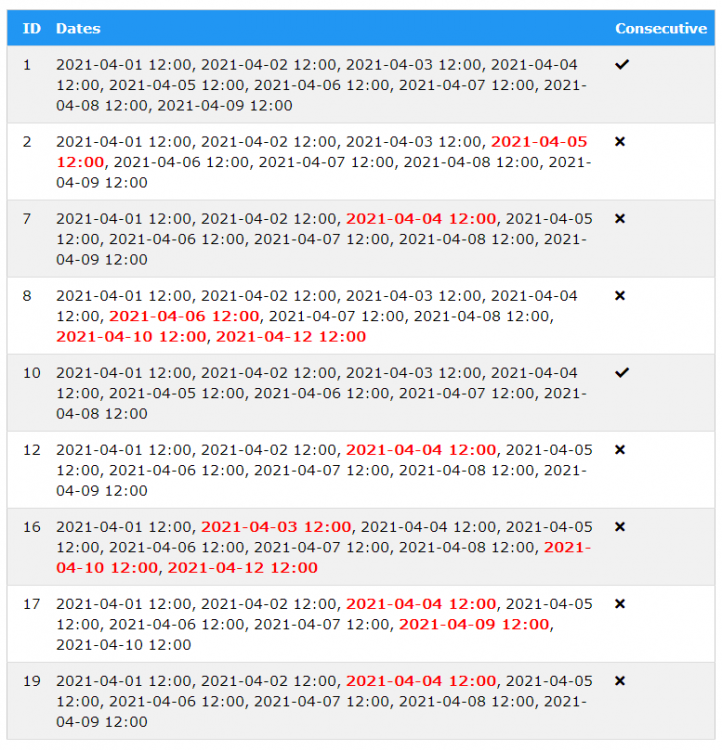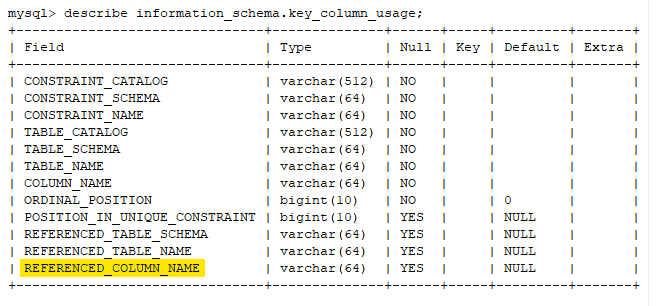-
Posts
24,614 -
Joined
-
Last visited
-
Days Won
835
Everything posted by Barand
-
Don't retrieve all the columns in all the records just to count them. Get a record count. $urole = 'MainAdmin'; $res = $pdo->prepare("SELECT count(*) as total FROM testuser WHERE role = ?; "); $res->execute([$urole]); $total = $res->fetchColumn();
-

why datatable count all entries, look at this codes
Barand replied to mahenda's topic in PHP Coding Help
First thing you should do is turn on error reporting and clear all your syntax errors. Then you can worry about getting the query right. -

how can i pass the selected value date to another page?
Barand replied to sashavalentina's topic in PHP Coding Help
Form inputs need a name attibute <select class="form-control" id="seller" name="seller"> You can then retrieve it in the receiving page from $_POST['seller'] (or $_GET['seller'] if your form method is "GET") Anything in the query string is retrieved from $_GET array eg $_GET['month']. If you form method is POST, I would put the date in a hidden form input value so all you date will be in the $_POST array. -

Check consecutive dates in comma seperated string
Barand replied to Adamhumbug's topic in MySQL Help
I'll eat my words. I couldn't resist the challenge so, having slept on it, I wrote a an SQL function "isConsecutive(dates)" to find records where there are fewer than 10 dates and they are consecutive. TEST DATA and QUERY TABLE: ahtest +----+-------------------------------------------------------------------------------------------------------------------------------------------------------------------------------------------------------------+ | id | adates | +----+-------------------------------------------------------------------------------------------------------------------------------------------------------------------------------------------------------------+ | 1 | 2021-04-01 12:00,2021-04-02 12:00,2021-04-03 12:00,2021-04-04 12:00,2021-04-05 12:00,2021-04-06 12:00,2021-04-07 12:00,2021-04-08 12:00 | | 2 | 2021-04-01 12:00,2021-04-02 12:00,2021-04-03 12:00,2021-04-04 12:00,2021-04-05 12:00,2021-04-06 12:00,2021-04-08 12:00,2021-04-10 12:00,2021-04-11 12:00,2021-04-12 12:00,2021-04-13 12:00,2021-04-14 12:00 | | 3 | 2021-04-01 12:00,2021-04-03 12:00,2021-04-04 12:00,2021-04-05 12:00,2021-04-06 12:00,2021-04-07 12:00,2021-04-08 12:00,2021-04-10 12:00,2021-04-11 12:00,2021-04-12 12:00 | | 4 | 2021-04-01 12:00,2021-04-02 12:00,2021-04-03 12:00,2021-04-04 12:00,2021-04-05 12:00,2021-04-06 12:00,2021-04-07 12:00,2021-04-08 12:00,2021-04-10 12:00,2021-04-11 12:00 | | 5 | 2021-04-01 12:00,2021-04-02 12:00,2021-04-03 12:00,2021-04-04 12:00,2021-04-05 12:00,2021-04-06 12:00,2021-04-07 12:00,2021-04-08 12:00,2021-04-09 12:00,2021-04-11 12:00,2021-04-12 12:00,2021-04-13 12:00 | | 6 | 2021-04-01 12:00,2021-04-02 12:00,2021-04-03 12:00,2021-04-05 12:00,2021-04-06 12:00,2021-04-07 12:00,2021-04-08 12:00,2021-04-09 12:00 | | 7 | 2021-04-01 12:00,2021-04-02 12:00,2021-04-03 12:00,2021-04-04 12:00,2021-04-06 12:00,2021-04-08 12:00,2021-04-09 12:00,2021-04-11 12:00,2021-04-12 12:00,2021-04-13 12:00 | | 8 | 2021-04-01 12:00,2021-04-02 12:00,2021-04-03 12:00,2021-04-04 12:00,2021-04-05 12:00,2021-04-06 12:00,2021-04-07 12:00,2021-04-08 12:00 | | 9 | 2021-04-01 12:00,2021-04-02 12:00,2021-04-03 12:00,2021-04-05 12:00,2021-04-06 12:00,2021-04-07 12:00,2021-04-08 12:00,2021-04-09 12:00,2021-04-11 12:00,2021-04-13 12:00,2021-04-15 12:00 | | 10 | 2021-04-01 12:00,2021-04-02 12:00,2021-04-03 12:00,2021-04-04 12:00,2021-04-05 12:00,2021-04-06 12:00,2021-04-08 12:00,2021-04-09 12:00,2021-04-10 12:00,2021-04-11 12:00,2021-04-13 12:00,2021-04-14 12:00 | | 11 | 2021-04-01 12:00,2021-04-02 12:00,2021-04-04 12:00,2021-04-06 12:00,2021-04-07 12:00,2021-04-08 12:00,2021-04-09 12:00,2021-04-10 12:00,2021-04-11 12:00,2021-04-12 12:00,2021-04-13 12:00,2021-04-14 12:00 | | 12 | 2021-04-01 12:00,2021-04-02 12:00,2021-04-03 12:00,2021-04-04 12:00,2021-04-05 12:00,2021-04-06 12:00,2021-04-07 12:00,2021-04-09 12:00,2021-04-10 12:00,2021-04-11 12:00,2021-04-12 12:00 | | 13 | 2021-04-01 12:00,2021-04-02 12:00,2021-04-03 12:00,2021-04-04 12:00,2021-04-06 12:00,2021-04-07 12:00,2021-04-08 12:00,2021-04-09 12:00,2021-04-10 12:00,2021-04-11 12:00,2021-04-13 12:00 | | 14 | 2021-04-01 12:00,2021-04-02 12:00,2021-04-03 12:00,2021-04-04 12:00,2021-04-05 12:00,2021-04-06 12:00,2021-04-07 12:00,2021-04-08 12:00 | | 15 | 2021-04-01 12:00,2021-04-02 12:00,2021-04-04 12:00,2021-04-05 12:00,2021-04-06 12:00,2021-04-07 12:00,2021-04-08 12:00,2021-04-09 12:00,2021-04-10 12:00,2021-04-11 12:00 | | 16 | 2021-04-01 12:00,2021-04-03 12:00,2021-04-04 12:00,2021-04-05 12:00,2021-04-06 12:00,2021-04-07 12:00,2021-04-08 12:00,2021-04-10 12:00,2021-04-11 12:00 | | 17 | 2021-04-01 12:00,2021-04-02 12:00,2021-04-04 12:00,2021-04-05 12:00,2021-04-06 12:00,2021-04-07 12:00,2021-04-08 12:00,2021-04-09 12:00,2021-04-10 12:00,2021-04-11 12:00 | | 18 | 2021-04-01 12:00,2021-04-02 12:00,2021-04-03 12:00,2021-04-04 12:00,2021-04-05 12:00,2021-04-06 12:00,2021-04-07 12:00,2021-04-08 12:00 | | 19 | 2021-04-01 12:00,2021-04-02 12:00,2021-04-03 12:00,2021-04-04 12:00,2021-04-05 12:00,2021-04-06 12:00,2021-04-07 12:00,2021-04-08 12:00,2021-04-10 12:00 | | 20 | 2021-04-01 12:00,2021-04-02 12:00,2021-04-03 12:00,2021-04-04 12:00,2021-04-06 12:00,2021-04-08 12:00,2021-04-10 12:00,2021-04-11 12:00,2021-04-12 12:00,2021-04-13 12:00,2021-04-14 12:00,2021-04-15 12:00 | +----+-------------------------------------------------------------------------------------------------------------------------------------------------------------------------------------------------------------+ mysql> SELECT id -> , adates -> FROM ahtest -> WHERE isConsecutive(adates); +----+-----------------------------------------------------------------------------------------------------------------------------------------+ | id | adates | +----+-----------------------------------------------------------------------------------------------------------------------------------------+ | 1 | 2021-04-01 12:00,2021-04-02 12:00,2021-04-03 12:00,2021-04-04 12:00,2021-04-05 12:00,2021-04-06 12:00,2021-04-07 12:00,2021-04-08 12:00 | | 8 | 2021-04-01 12:00,2021-04-02 12:00,2021-04-03 12:00,2021-04-04 12:00,2021-04-05 12:00,2021-04-06 12:00,2021-04-07 12:00,2021-04-08 12:00 | | 14 | 2021-04-01 12:00,2021-04-02 12:00,2021-04-03 12:00,2021-04-04 12:00,2021-04-05 12:00,2021-04-06 12:00,2021-04-07 12:00,2021-04-08 12:00 | | 18 | 2021-04-01 12:00,2021-04-02 12:00,2021-04-03 12:00,2021-04-04 12:00,2021-04-05 12:00,2021-04-06 12:00,2021-04-07 12:00,2021-04-08 12:00 | +----+-----------------------------------------------------------------------------------------------------------------------------------------+ THE FUNCTION DELIMITER $$ CREATE FUNCTION `isConsecutive`(dates varchar(255)) RETURNS int(11) BEGIN DECLARE k INTEGER DEFAULT 1; DECLARE da DATE DEFAULT SUBSTRING_INDEX(dates, ',', 1); DECLARE db DATE ; DECLARE num INTEGER DEFAULT (LENGTH(dates)+1) DIV 17; DECLARE strx VARCHAR(255) DEFAULT SUBSTRING_INDEX(dates, ',', -(num-k)); DECLARE isconsec INTEGER DEFAULT 1; IF num >= 10 THEN RETURN 0; END IF; WHILE LENGTH(strx) > 0 DO SET db = SUBSTRING_INDEX(strx, ',', 1); if DATEDIFF(db, da) <> 1 THEN SET isconsec = 0; END IF; SET k = k + 1; SET da = SUBSTRING_INDEX(strx, ',', 1); SET strx = SUBSTRING_INDEX(strx, ',', -(num-k)); END WHILE; RETURN isconsec; END$$ DELIMITER ; -

Check consecutive dates in comma seperated string
Barand replied to Adamhumbug's topic in MySQL Help
In a couple of weeks time, when your scalp is bleeding from all the head-scratching trying to do it with only SQL, have a go with this PHP/SQL hybrid. // // GENERATE TEST DATA // $pdo->exec("DROP TABLE IF EXISTS ahtest"); $pdo->exec("CREATE TABLE ahtest( id int not null auto_increment primary key, adates varchar(255))"); $data = []; for ($i=0; $i<20; $i++) { $numdates = rand(8,12); $dt = new DateTime('2021-04-01'); $dates = []; $incs = [1,1,1,1,1,2,1,1,1,1,1,2]; // 16.6% chance of non-consecutive dates for ($j=0; $j<$numdates; $j++) { $inc = $incs[array_rand($incs)]; $dates[] = $dt->format('Y-m-d h:i'); $dt->modify("+ $inc days"); } $data[] = sprintf("('%s')", join(',', $dates)); } $pdo->exec("INSERT INTO ahtest (adates) VALUES " . join(',', $data)); // // GET RECORDS WITH < 10 DATES // $res = $pdo->query("SELECT id , adates FROM ahtest WHERE LENGTH(adates) < 160 "); $tdata = ''; foreach ($res as $r) { $datelist = $r['adates']; $consec = isConsec($datelist) ? "<i class='fas fa-check'></i>" : "<i class='fas fa-times'></i>"; $tdata .= "<tr><td>{$r['id']}</td> <td>$datelist</td> <td>$consec</td> </tr> "; } function isConsec(&$datelist) { $dates = explode(',', $datelist); $newdates[] = $dates[0]; $result = 1; $k = count($dates); for ($i=1; $i<$k; $i++) { $a = new DateTime($dates[$i-1]); $b = new DateTime($dates[$i]); if ($a->diff($b)->days != 1) { $newdates[] = "<span class='nonconsec'>{$dates[$i]}</span>"; $result = 0; } else $newdates[] = $dates[$i]; } $datelist = join(', ', $newdates); return $result; } ?> <!DOCTYPE html> <html lang="en"> <head> <title>Dates Example</title> <meta http-equiv="Content-Type" content="text/html; charset=utf-8"> <link rel="stylesheet" href="https://www.w3schools.com/w3css/4/w3.css"> <link rel="stylesheet" href="https://use.fontawesome.com/releases/v5.15.1/css/all.css"> <style type='text/css'> .nonconsec { font-weight: 600; color: red; } </style> </head> <body> <div class="w3-container"> <div class="w3-panel w3-black w3-padding"> <h1>Dates Example - AdamHumbug</h1> </div> <table class='w3-table-all'> <tr class='w3-blue'> <th>ID</th> <th>Dates</th> <th>Consecutive</th> </tr> <?=$tdata?> </table> </div> </body> </html> Gives -

Check consecutive dates in comma seperated string
Barand replied to Adamhumbug's topic in MySQL Help
Then normalize your data and you stand a chance. Or, as previously stated, be prepared to use php arrays. Arrays/delimited strings of data and SQL don't play nice. Fine if all you want to do is store them as string and retrieve them as a string. You might be able to extract the dates using SUBSTRING_INDEX but I wouldn't attempt it with so many dates and especially when the number of dates is variable. -
try echo "<table>"; while ($row = odbc_fetch_array($result)) { if($row['UOMPTRUCKNUMBER'] != $loadid) { if ($loadid != 0) { echo "<tr style='background:#eee'> <td colspan='4'>TOTAL</td> <td>$TotalPcs</td> <td> </td> <td>$LoadTotal</td> </tr>"; } echo "<tr style='background:#82fbfd'>"; echo '<th>'.$row['UOMPTRUCKNUMBER']."</th>"; echo "<th>Drop</th>"; echo "<th>OrderID</th>"; echo "<th>CustID</th>"; echo "<th>QTY</th>"; echo "<th>Cubes</th>"; echo "<th>Total</th></tr>"; $TotalPcs=0; $loadTotal=0; } ShowDetail($row); $loadid = $row['UOMPTRUCKNUMBER']; $TotalPcs+=round($row['QTY'],0); $loadTotal +=$row['total']; } echo "<tr style='background:#eee'> <td colspan='4'>TOTAL</td> <td>$TotalPcs</td> <td> </td> <td>$LoadTotal</td> </tr> </table> ";
-

Check consecutive dates in comma seperated string
Barand replied to Adamhumbug's topic in MySQL Help
If you store data in that manner you deserve to have problems. You can use a query to get those with < 10 dates but you will need to resort to php arrays for the rest. -
I use MySQL Workbench (it's free and I hate phpMyAdmin)
-
Not much modification required. I've commented the changes needed. while ($row = odbc_fetch_array($result)) { echo "<table>"; echo "<tr style='background:#82fbfd'>"; if($row['UOMPTRUCKNUMBER'] != $loadid) { if ($loadid != 0) { # ADD // OUTPUT PREVIOUS TRUCK TOTAL HERE # ADD } # ADD echo '<th>'.$row['UOMPTRUCKNUMBER']."</th>"; echo "<th>Drop</th>"; echo "<th>OrderID</th>"; echo "<th>CustID</th>"; echo "<th>QTY</th>"; echo "<th>Cubes</th>"; echo "<th>Total</th></tr>"; $TotalPcs=0; $loadTotal=0; } ShowDetail($row); $loadid = $row['UOMPTRUCKNUMBER']; $TotalPcs+=round($row['QTY'],0); $loadTotal +=$row['total']; } // OUTPUT TOTALS FOR LAST TRUCK HERE # ADD
-
Now you have told us the actual context it makes a lot more sense than having reusable member IDs. You also introduced a couple of other attributes that would be stored in the "berth" table (renamed from member_no) viz. Size and Pier. Size required would need to be known at time of allocation to a member. Reallocation of a different berth would need to be a custom transaction, allocation on insert could be a trigger function, de-allocation could be a foreign key cascade option. Your assertion that a member is deleted when their boat changes is FUBAR. Change, or add, a record in the member boat table. The boat size in this table would determine the size required for the new berth. or
-
I would created a pre-populated table "member_no" which contains a row for each of those values. create table member_no ( memno varchar(3) not null primary key, member_id int ); The "member" table would have a conventional auto_incremented numeric id (not re-used). TABLE member_no TABLE member +----------+------------+ +-----------+------------------+------ | memno | member_id | | member_id | name | etc. +----------+------------+ +-----------+------------------+----- | 01 | 1 | | 1 | Curly | | 02 | 2 | | 2 | Larry | | 03 | 9 | | 8 | Mo | | 04 | 17 | | 9 | Fred | | 05 | 8 | | 15 | Wilma | | 06 | 15 | | 16 | Barny | | 07 | 16 | | 17 | Betty | | 08 | null | | ... | null | | 999 | null | When a new member joins (say, id=18) they assigned to the first memno with a null member_id (08). When a member leaves, their member_id in the member_no table is set back to null. You could use triggers on insert and delete to automate the process.
-
Given that for any piece of work, 90% of the task takes 90% of the effort. The final 10% takes another 90%. I'd go with the maximum and double it 😀
-
Only checked checkboxes are posted so doing it that way the indexes can get out of synch. I'd recommend using the id as the input array keys. <input type=checkbox name='service_id[$id]' .. > <input type='date' name='date[$id]' .. > etc
-
What are you entering into your browser's address bar to execute it?
-
Does the file containing that code have a ".php" extension?
-
-
Perhaps SELECT u.referenced_table_name , group_concat(u.referenced_column_name separator ', ') as ref_col_name , u.table_name , group_concat(u.column_name separator ', ') as col_name , u.constraint_name FROM information_schema.key_column_usage u JOIN information_schema.table_constraints c USING (constraint_schema,constraint_name) WHERE c.constraint_schema = ? AND c.constraint_type = 'FOREIGN KEY' GROUP BY u.constraint_name ORDER BY referenced_table_name, referenced_column_name
-
Because you haven't specified that phoneno is unique.
-

Trying to figure out why my upload.php files is rejecting some files
Barand replied to Fishcakes's topic in PHP Coding Help
Those single quotes shouldn't be there $Thumbnail = "upload/Thumbnails/'$fileName'"; ^ ^ -

Trying to figure out why my upload.php files is rejecting some files
Barand replied to Fishcakes's topic in PHP Coding Help
$_FILES['file']['error'] shouldn't be blank. Even if no file is selected for upload it will be "4", and "0" if there is no error. Post your input form code. -

Trying to figure out why my upload.php files is rejecting some files
Barand replied to Fishcakes's topic in PHP Coding Help
Are there any clues in $_FILES['file']['error'] ?







